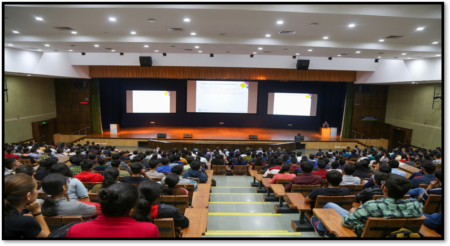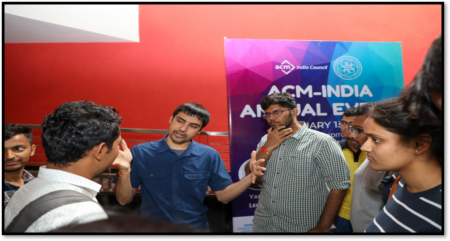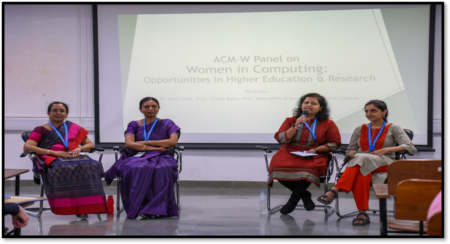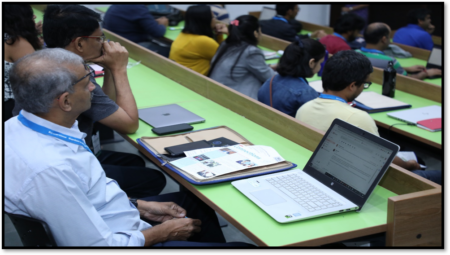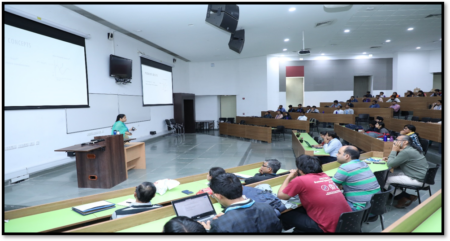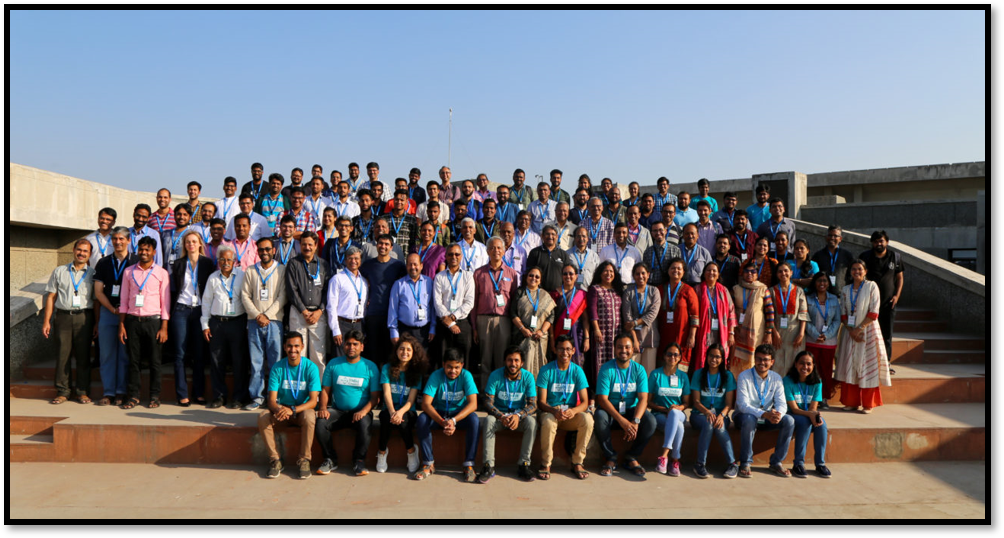
“The purpose of computing is insight.” – Richard Hamming, American mathematician whose work had many implications for computer engineering and telecommunications
To discuss the hot topics of the present times in the domain of computer science and technology and celebrate India’s accomplishments in computing, the Indian Institute of Technology, Gandhinagar, organized three significant events from 13th to 15th February 2020. The Institute conducted the 14th edition of IRISS (Inter-Research-Institute Student Seminar in Computer Science) on 13th and 14th February, ACM-W (Association for Computing Machinery’s Council on Women in Computing) workshop on promoting women in computer science and research on 14th February and the ACM Annual Event 2020 on 15th February. More than 1200 students, researchers, scholars, scientists, faculty members, and professionals participated in these gatherings from around the world.
ACM-India Annual Event
This event started with a welcome speech by Harish PM (Dean, Students Affairs, IITGN) and provided insights about IITGN’s core values, innovative mindset, and inclusive environment. Next followed the ACM report by Cherri M Pancake (Professor- Emeritus Oregon State University, Director-NASCE, and President- ACM). She introduced the participants to various activities of this council aimed at advancing computing as a science and a profession. Encouraging everyone to volunteer for this organization, she highlighted that it helps to learn, build relationships, gain experiences, and grow as individuals. Abhiram Ranade (President, ACM-India), reported on the India Council’s latest initiatives in CSE education, research, continuing education for professionals, networking, gender issues, pedagogy and assessment, influence policy, and industry-academia alliances. He also talked about the CS-Pathshala initiative, a Computational Thinking Curriculum for children of class-grade I to class-grade VIII, which propagates the essentials of computer science research.
Yann LeCun (renowned computer scientist- New York University and Chief AI Scientist- Facebook) delivered a thought-provoking talk titled ‘Self Supervised Learning: The Next Step In AI.’ The 2018 ACM Turing Award (Nobel Prize in Computing) Winner, he emphasized that with proper data, Supervised Deep Learning works well and can save lives. Next in line was the session by Susanne Albers (recipient- Gottfried Wilhelm Leibniz Prize and German theoretical computer scientist- Technische Universität München). Titled ‘Algorithms Beyond the Worst Case,’ it was a detailed tour of modern approaches to analysis that dig deeper than worst-case. These account for the richness of input and help us have a more nuanced understanding of the actual performance of an algorithm.
‘New Ways of Thinking of the Mobile Phone for Healthcare’ was the title of the lecture given by Shwetak Patel (computer scientist, entrepreneur- University of Washington, and Winner of the 2018 ACM Prize in Computing). Highlighting the potential advancements in health science through the confluence of computational techniques and human-computer interactions, he encouraged the participants to work towards the major issues of the present-day world. The last keynote talk by M Balakrishnan (CSE- IIT Delhi, founding Vice-Chancellor- Satya Bharti Institute of Technology and ACM Eugene L Lawler Award Winner) was about ‘Assistive Technology Solutions for Mobility & Education of Visually Impaired’. Pinpointing the vitality of an affordable, user-centric, and infrastructure-friendly assistive technology design for the visually impaired in India, he also addressed the hurdles in translational research and its propagation in this branch of study.
ACM-W (India) Workshop on Women in Computer Science and Research
This workshop kicked-off with a warm address by Heena Timani, Chair of ACM-W India. Highlighting the critical functions of ACM-W, she explained several programs of this Council in detail. Cherri Pancake delivered the first keynote – ‘ACM Can Help Us Change Our Male-Dominated Field’ – during which she expressed that ACM-W is all about being a leader in computing. It is about being proactive, progressive, patient, strategic, flexible, the best, and strong change agents. Next followed an engaging session by Arati Dixit (Senior Scientist- ARA and Research Associate Professor- NC State University, Raleigh, USA). Her session, titled ‘Let’s Enjoy +, Empower ++ in Computing with ACM,’ gave insights on the Council’s latest female-centered initiatives, particularly about the various scholarships available for women. She also discussed the future possibilities of efficient networking among different student chapters in a particular region.
Lipika Dey (Principal Scientist- TCS Innovation Lab) gave an invited talk on ‘Data Analytics.’ Starting her lecture by advising the females to utilize all possible opportunities to lead, give their best, and adopt a positive outlook to all situations, she progressed to talk about the changing buzz words synonymous with data analytics. She concluded that conversion of data to knowledge is still a dream which can become a reality through the proper utilization of data analytics. ‘Building Technologies for Low Resource Languages’ was the session by Kalika Bali (Principal Researcher- Microsoft Research Lab, India), which focused on computing technologies that can assist in promoting low resource languages. An interesting presentation by Joycee Mekie (Assistant Professor- IITGN) provided insights into the world of approximations, which constitute a significant part of the computing field. It addressed some of the crucial trending questions of this area.
Meenakshi D’Souza (Associate Professor- IIIT Bangalore), Arati M. Dixit, Nutan Limaye (Associate Professor- IIT Bombay), and Chitra Babu (Professor and HOD- SSN College of Engineering) were the panelists during a discussion on Opportunities for Women in Higher Education and Research. Sharing stories of the challenges they faced as women, personally and professionally, they advised the female students of today on how to carve a niche for themselves and become leaders in the branch of Computer Science.
14th Inter-Research-Institute Student Seminar in Computer Science
The two-day event started with the inaugural speech by Sudhir Jain (Director, IITGN), in the presence of Jayant Haritsa (IISc Bangalore, Steering Committee Chair- IRISS), Amit Prashant (Dean- RnD, IITGN), Neeldhara Misra (IITGN, Program Committee Chair- IRISS) and Anirban Dasgupta (CSE Discipline Coordinator, IITGN). Prof Jain highlighted the three core values of the Institute, viz., Students First, Research for Impact, and Societal Concerns, on which the IITGN community will build the 21st century Nalanda or Takshashila that will be the pride of this country.
An interesting panel discussion titled ‘Pedagogy and Grad School,’ included Vipul Shah (TCS and CSpathshala), Sudarshan Iyengar (IIT Ropar), Arjun Arul (Codechef), and Manish Jain (Center for Creative Learning, IITGN) as panelists. They discussed the ways by which the students can become more interested in the in-depth exploration of different topics of study. The stress was on developing a practical mindset, rather than students adopting a theoretical approach to any field or discipline.
‘How to Do and Survive a Ph.D.?’ was a captivating Early Career Researcher Talk by Umang Bhaskar (Tata Institute of Fundamental Research). It centered on comprehensive guidance about three essential points viz., doing quality research, getting a job in academia, and doing that job efficiently and concluded with the take-home lessons of having a life outside a Ph.D. and finding true friends. ‘What to Do During a Ph.D.?’ was yet another thought-provoking session by Neel Gala (Incore Semiconductors), which delved deeper into the basics of a Ph.D. in any field. It kicked off with the ideology of ‘Think Common, Think Bigger,’ encouraging the participants to always focus on the burning topics of society. The talk came to an end with Dr. Gala urging the participants to explore indigenous questions and issues. Going indigenous with a correct approach always helps a person to stay on the top.
Nikhil Rasiwasia (applied science manager- at Amazon) gave a talk titled ‘Applied Science: A Machine Learning Perspective.’ The session focused on the criteria for choosing research or industry as a profession after one has completed their education. It concluded with the message that all are unique, and we should adopt a business-first research approach, look for end-to-end solutions, and work in collaboration. Bhavana Kanukurthi (CSA, IISc Bangalore) delivered a keynote on ‘Privacy Amplification (via Non-malleable Codes).’ She explained that most of the time, the world interacts with gadgets that it doesn’t necessarily trust – how to communicate in such situations securely? That’s what cryptography widely addresses, and it has a lot of randomness associated with it. Her lecture was about how to generate uniform randomness from something that is not uniform.
Apart from these, several other sessions ranged from covering the fundamentals to deciphering the intricate spheres of computing and provided excellent opportunities to students and researchers. These mega-events saw the development of influential networks between interested participants and eminent minds in computer science education and research, which paved the way for future discussions and collaborations on a diverse variety of topics.
“Networking is not about just connecting people. It’s about connecting people with people, people with ideas, and people with opportunities.” – Michele Jennae, author

